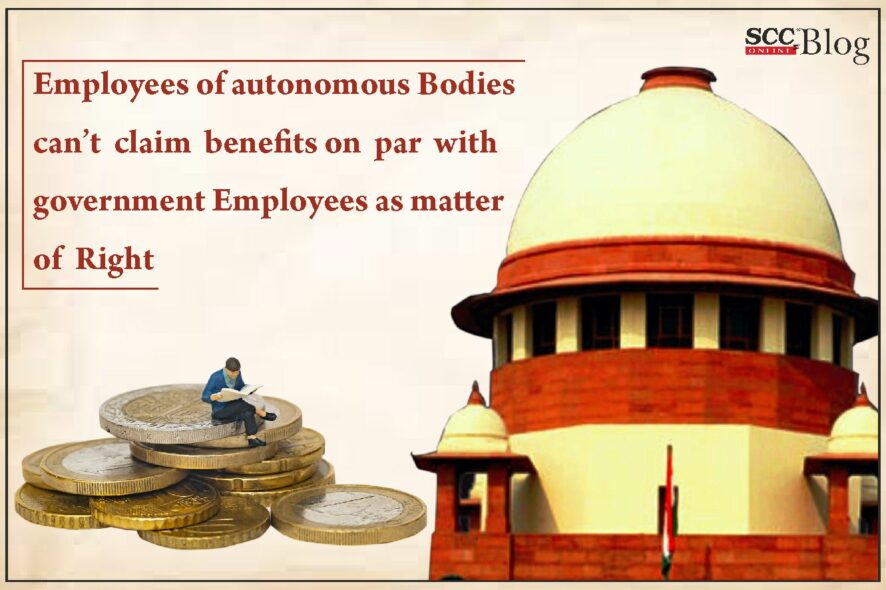Supreme Court: Finding the Bombay High Court’s judgment directing the State to extend the pensionary benefits to the employees of Water and Land Management Institute (WALMI) unsustainable, both in law and on facts, the bench of MR Shah* and BV Nagarathna, JJ held that the employees of WALMI, which is an independent autonomous body registered under the Societies Act are not entitled to the pensionary benefits and that,
“… the employees of the autonomous bodies cannot claim, as a matter of right, the same service benefits on par with the Government employees.”
Holding that the State Government and the Autonomous Board/Body cannot be put on par, the Court explained that,
“Merely because such autonomous bodies might have adopted the Government Service Rules and/or in the Governing Council there may be a representative of the Government and/or merely because such institution is funded by the State/Central Government, employees of such autonomous bodies cannot, as a matter of right, claim parity with the State/Central Government employees. This is more particularly, when the employees of such autonomous bodies are governed by their own Service Rules and service conditions.”
Cautioning the Courts to refrain from interfering with the policy decision, which might have a cascading effect and having financial implications, the Court observed that whether to grant certain benefits to the employees or not should be left to the expert body and undertakings and the Court cannot interfere lightly. Granting of certain benefits may result in a cascading effect having adverse financial consequences.
In the case at hand, WALMI being an autonomous body, registered under the Societies Registration Act, the employees of WALMI are governed by their own Service Rules and conditions, which specifically do not provide for any pensionary benefits; the Governing Council of WALMI has adopted the Maharashtra Civil Services Rules except the Pension Rules.
The State Government has taken such a policy decision in the year 2005 not to extend the pensionary benefits applicable to the State Government employees to the employees of the aided institutes, boards, corporations etc.; and the proposal of the then Director of WALMI to extend the pensionary benefits to the employees of WALMI has been specifically turned down by the State Government.
In such facts and circumstances, the Supreme Court held that the High Court was not justified in directing the State to extend the pensionary benefits to the employees of WALMI, which is an independent autonomous entity.
The Court was also not pleased with High Court’s observation that as the salary and allowances payable to the employees of WALMI are being paid out of the Consolidated Fund of the State and/or that the WALMI is getting grant from the Government are all irrelevant considerations, so far as extending the pensionary benefits to its employees is concerned. It noticed that WALMI has to run its administration from its own financial resources. WALMI has no financial powers of imposing any tax like a State and/or the Central Government and WALMI has to depend upon the grants to be made by the State Government.
Observing that the grant of pensionary benefits is not a one-time payment but a recurring monthly expenditure and there is a continuous liability in future towards the pensionary benefits. The Court said that merely because at one point of time, WALMI might have certain funds does not mean that for all times to come, it can bear such burden of paying pension to all its employees. In any case, it is ultimately for the State Government and the Society (WALMI) to take their own policy decision whether to extend the pensionary benefits to its employees or not. Hence, the interference by the Judiciary in such a policy decision having financial implications and/or having a cascading effect is not at all warranted and justified.
[State of Maharashtra v. Bhagwan, 2022 SCC OnLine SC 25, decided on 10.01.2022]
*Judgment by: Justice MR Shah
Counsels
For Appellants: SG Tushar Mehta and AOR Sachin Patil
For respondents: Advocate J.N. Singh






